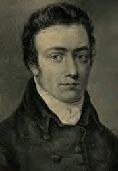- British Poet -
( 1772 - 1834 )

- British Poet -
( 1772 - 1834 )

| * List of the stories
he appears in :
- D 90314 : "Return to Xanadu", from 1991, by Don Rosa (by name only). |
* His biography :
Samuel Taylor Coleridge
was born in Ottery St. Mary, England on October 21, 1772, to the minister
John
Coleridge and Ann Bowden. In 1781, he was sent away to a London
charity school for children of the clergy after his father's death. Hedevoured
books and was first in his class. His brother Luke died in 1790 and his
only sister Ann in 1791. As he was very ill around this time, he
probably took laudanum for the illness, and became addicted to opium.
He went to Cambridge in 1791, starting
to hope for poetic fame, but rapidly worked himself into debt with opium,
alcohol, and women. So in 1793, he joined the army but escaped when he
was to be sent in France and he went back to Cambridge, where he became
friend with Robert Southey. Both political radicals, they began
planning Pantisocracy, their own socio-political movement. In 1795, he
married Sara Southey, Robert's sister, with whom he had three children,
David
Hartley, William, and Sara. Thanks to Robert, he met
William
Wordsworth, and fell in love with his sister-in-law, Sara Hutchinson
, putting an extra strain on an already iffy marriage.
His Poems were published
in 1797, followed by Lyrical Ballads in 1798, and he was becoming
famous. With William, he created the Romantic movement. They
went to Germany with William's sister Dorothy, but Samuel went back to
France in 1799, when his son Berkeley died from a reaction to a vaccination.
He turned to newspaper work in 1801
to try and recover financially. In 1804, he left for Malta for the climate,
and here he spied a bit for his Majesty, who wanted Malta as a British
port, though officially Col was the temporary Public Secretary. He returned
to England in 1806, asked for a legal separation from his wife and was
again writing newspaper articles to earn a living. He tried to release
himself from his addiction but failed, and his paranoia and mood swings,
were getting worse, so he moved into the house of an apothecary named James
Gillman and asked him to help break free with opium.
Samuel was publishing new
works, like Aids to Reflection in 1825, and was reprinting old ones
in hopes of finally making a real financial contribution to his family.
By 1830, the reviews of his work were becoming more and more positive,
and he was hailed as the finest critic of his day. But he still couldn't
reach financial securit, and a government reorganization lost him his pension
from the Royal Society of Literature, his one remaining reliable
source of income.
He died peacefully on July 25, 1834.
Samuel Taylor Coleridge,
inspired by Samuel Purchas' Pilgrimes,
wrote a poem about Kublai Khan and Xanadu in 1798, entitled Kubla
Khan (click the link to see the poem). This poem was first published
in 1816 with Christabel and "The Pains of Sleep" with the
sub-heading: "Or, a Vision in a Dream. A Fragment."
* His place in the Barks/Rosa stories universe
:
In "Return to Xanadu", Samuel Taylor Coleridge's
name is evocated when the Ducks arrive in Xanadu / Tralla La, and see inscription
on the walls, and compare it to Samuel's poem Kubla Khan about Xanadu
and
Kublai
Khan. They also speak about his fascination for Samuel
Purchas' books.
In Barks' "The Not-so-Ancient Mariner"(WDC 312-01,
1966), that references Coleridge's "The Rime of the Ancient Mariner"
(1798), Donald enters a contest about sea-themed poems.Donald wins because
the
question happened to be "Which were the last verses of "The Rime
of The Ancient Mariner" ?".Donald answers correctly because he
had memorized the whole poem.The price was a place in a cruise but quickly
Donald finds he just won the cheapest place. He proceeds to having many
bad luck incidents concerning fellow passengers Daisy Duck and Gladstone
Gander. He even shoots an Albatros with a bow just like Samuel's mariner...
>>>Back to the real life's characters page
>>> Back to the main page